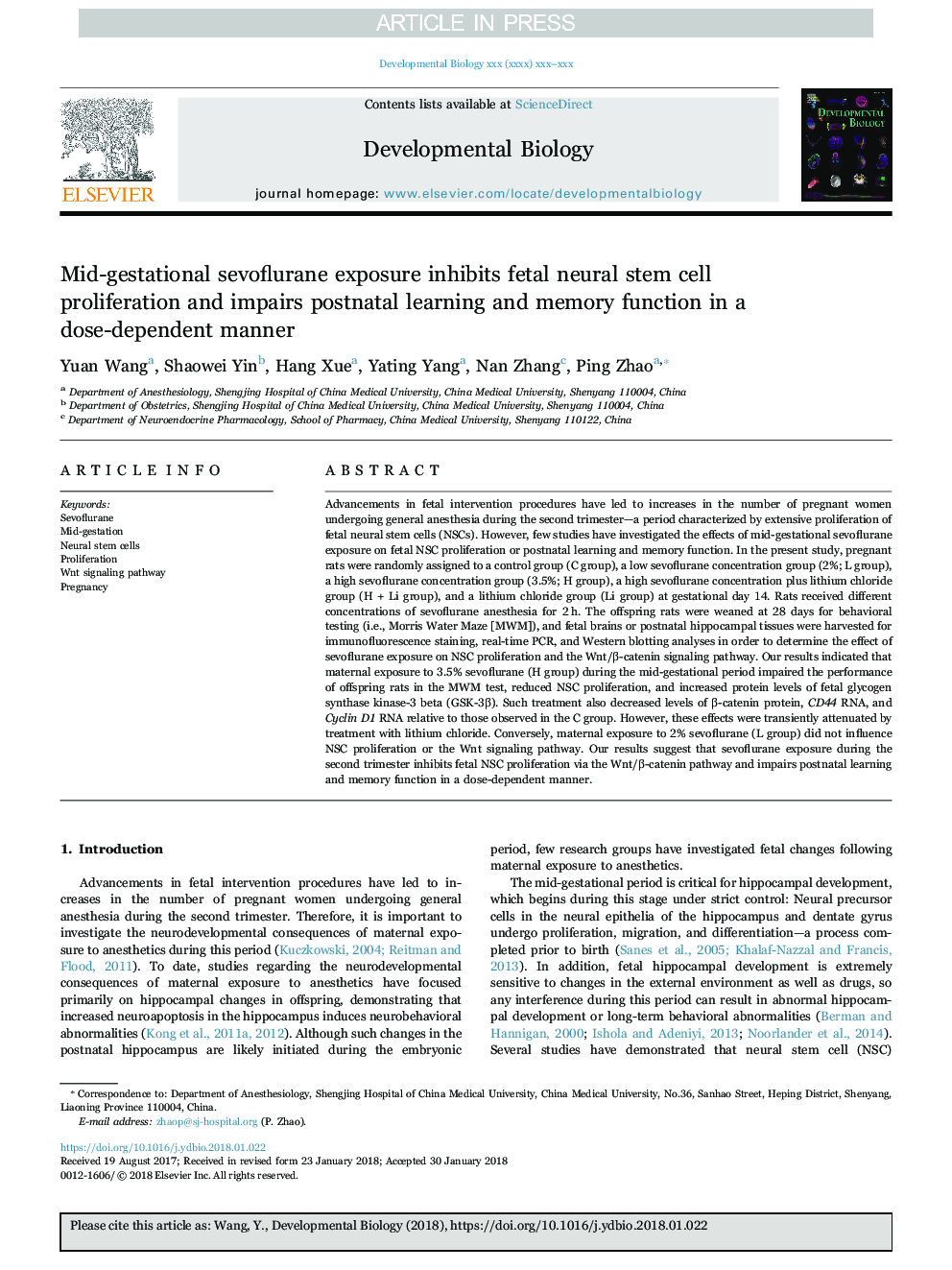| کد مقاله | کد نشریه | سال انتشار | مقاله انگلیسی | نسخه تمام متن |
|---|---|---|---|---|
| 8467444 | 1549552 | 2018 | 13 صفحه PDF | دانلود رایگان |
عنوان انگلیسی مقاله ISI
Mid-gestational sevoflurane exposure inhibits fetal neural stem cell proliferation and impairs postnatal learning and memory function in a dose-dependent manner
ترجمه فارسی عنوان
قرار گرفتن در معرض قرار گرفتن در معرض نوروفلوران میوپرولوئوروسیته سلولهای بنیادی عصبی جنین را مهار می کند و یادگیری و عملکرد حافظه پس از زایمان را به صورت وابسته به دوز متاثر می کند
دانلود مقاله + سفارش ترجمه
دانلود مقاله ISI انگلیسی
رایگان برای ایرانیان
کلمات کلیدی
موضوعات مرتبط
علوم زیستی و بیوفناوری
بیوشیمی، ژنتیک و زیست شناسی مولکولی
بیولوژی سلول
چکیده انگلیسی
Advancements in fetal intervention procedures have led to increases in the number of pregnant women undergoing general anesthesia during the second trimester-a period characterized by extensive proliferation of fetal neural stem cells (NSCs). However, few studies have investigated the effects of mid-gestational sevoflurane exposure on fetal NSC proliferation or postnatal learning and memory function. In the present study, pregnant rats were randomly assigned to a control group (C group), a low sevoflurane concentration group (2%; L group), a high sevoflurane concentration group (3.5%; H group), a high sevoflurane concentration plus lithium chloride group (H + Li group), and a lithium chloride group (Li group) at gestational day 14. Rats received different concentrations of sevoflurane anesthesia for 2â¯h. The offspring rats were weaned at 28 days for behavioral testing (i.e., Morris Water Maze [MWM]), and fetal brains or postnatal hippocampal tissues were harvested for immunofluorescence staining, real-time PCR, and Western blotting analyses in order to determine the effect of sevoflurane exposure on NSC proliferation and the Wnt/β-catenin signaling pathway. Our results indicated that maternal exposure to 3.5% sevoflurane (H group) during the mid-gestational period impaired the performance of offspring rats in the MWM test, reduced NSC proliferation, and increased protein levels of fetal glycogen synthase kinase-3 beta (GSK-3β). Such treatment also decreased levels of β-catenin protein, CD44 RNA, and Cyclin D1 RNA relative to those observed in the C group. However, these effects were transiently attenuated by treatment with lithium chloride. Conversely, maternal exposure to 2% sevoflurane (L group) did not influence NSC proliferation or the Wnt signaling pathway. Our results suggest that sevoflurane exposure during the second trimester inhibits fetal NSC proliferation via the Wnt/β-catenin pathway and impairs postnatal learning and memory function in a dose-dependent manner.
ناشر
Database: Elsevier - ScienceDirect (ساینس دایرکت)
Journal: Developmental Biology - Volume 435, Issue 2, 15 March 2018, Pages 185-197
Journal: Developmental Biology - Volume 435, Issue 2, 15 March 2018, Pages 185-197
نویسندگان
Yuan Wang, Shaowei Yin, Hang Xue, Yating Yang, Nan Zhang, Ping Zhao,
